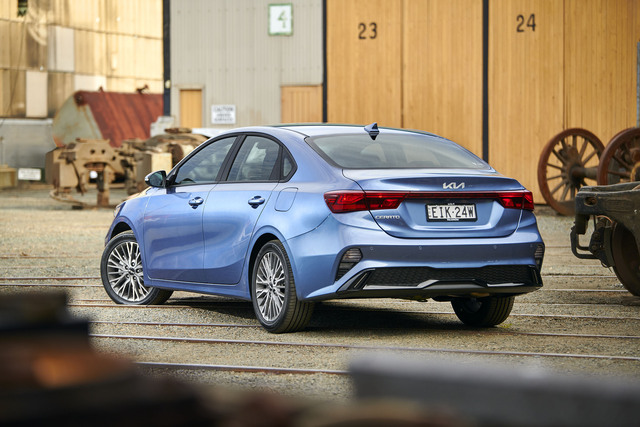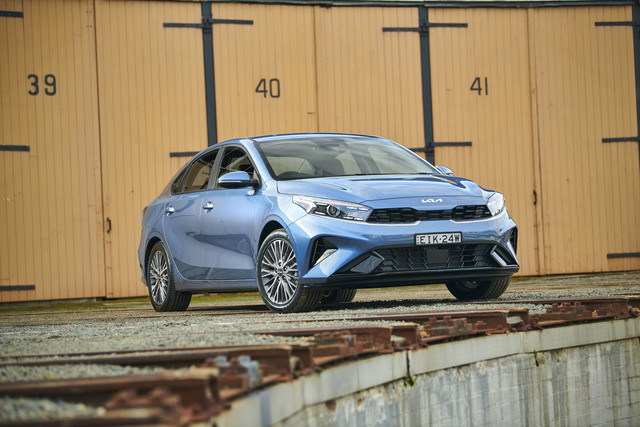Launched here in 2004, the small Cerato hatch or sedan has been one of Kia’s biggest sellers, often sharing the Australian sales podium alongside Toyota Corolla, Hyundai i30 and Mazda3.
The current, fourth generation, Cerato has been on sale here since 2018 with an upgrade in 2021 adding new tech features as well as the fresh new Kia logo.
The next generation Cerato is due early in 2025 but it will be given a name change, adopting the global name of K4.
Let’s hope that Kia doesn’t face the same negative buyer reaction that Nissan did back in 2006 when, under instructions from its Tokyo head office, the popular and well-established Pulsar nameplate was dropped and replaced by the unknown Tiida leaving potential buyers either confused, angry, or both
We don’t anticipate that happening with the Cerato/K4 change. Kia has one of the smartest marketing teams in the business, as shown by its brilliant sporting superstar advert for the upcoming Tasman ute.
But, enough about the future, the Cerato remains on sale now as an excellent alternative in its small hatch/sedan category.
It comes with the choice of four variants: S, Sport, Sport + and GT, all with either five-door hatchback or four-door sedan bodies. Prices range from $27,060 for the S through to $36,860 for the GT. There’s no difference between the hatch and sedan.
Don’t get too excited about the use of the Sport and Sports + name. Both models get the same 2.0-litre petrol engine with the same modest outputs as the S.
Sport and Sport+ do get 17-inch alloy wheels while the S has 16-inch steels.
Our test vehicle was the Sport + hatch.
STYLING
The 2021 Cerato upgrade was one of the first models to get the new stylised badge which has now spread across the Kia range.
Other new features include a revised headlamp design extending the grille pattern out to the car’s flanks, the reworked front bumper adding a sleek sporty character.
Front foglamps are slotted into the air intake grille, sharpening the looks up front. In profile the Cerato hatch is a model of restraint, with one exception, An alternative design for the 17-inch alloy wheels differentiates the Sport and Sport + from the rest of the range.
At the rear the exhaust has been concealed for an up-to-date hatchback appearance.
DRIVELINES
Cerato S, Sport and Sport+ are powered by a 2.0-litre, four-cylinder petrol engine producing 112 kW and 192 Nm, while the GT comes with a 1.6-litre turbo-petrol four-cylinder motor with 150 kW and 265 Nm.
The 2.0-litre engine is paired to a six-speed automatic while the GT’s turbo engine gets a double-clutch (DCT) seven-speed auto. Minimal sales saw the demise of the previous six-speed manual gearbox at the 2021 upgrade.
INTERIOR
Kia Cerato has a well-designed and practical interior with everything in the right place.
There’s reasonable rear legroom although the sunroof in the GT does limit head space.
Rear seat occupants also get a fold down armrest with cup holders, USB socket and air vents.
Sport+ has leather-appointed seats, heated upfront, that are comfortable without being supportive in a lateral context.
Other carryover features include electrochromic mirror, and power exterior folding mirrors, soft-touch trim, illuminated glovebox and passenger-side seat-back pocket.
Luggage space with the rear seatbacks folded is 428 litres in the hatch and 502 litres in the sedan.
INFOTAINMENT
Standard across the Cerato range are a 10.25-inch audio-visual unit with an LCD screen and a 4.2-inch TFT LCD cluster.
The latter displays information such as drive mode (normal, eco, sport, smart), average and instantaneous fuel consumption, trip meter and odometer, fuel range, lane keep assist status driver attention level and compass bearing.
Built-in satellite navigation, with 10-year MapCare and SUNA traffic updates, also allows access to DAB digital radio, voice recognition, wired Apple CarPlay or Android Auto, plus the dial-up soothing Sounds of Nature.
To maintain occupant aural pleasure all round, a rear-seat sleep mode can be called on to limit the speaker level in the back for occupants to enjoy a more restful environment.
SAFETY
Cerato comes with a comprehensive list of safety features that include six airbags, enhanced ABS brakes, stability control, autonomous emergency braking, lane keep assist, lane follow assist, lane departure warning and driver attention alert.
There are also front and rear parking sensors, high beam assist; reversing camera; and two IsoFix child seat anchor points.
Sport + and GT add blind spot recognition; blind spot collision avoidance assist, rear cross traffic alert, safe exit warning; and enhanced AEB to include pedestrian and cyclist recognition.
An optional $1000 Safety Pack is available for the S and Sport models that adds a Cyclist AEB, electronic parking brake; blind spot detection; and rear cross traffic alert.
DRIVING
As mentioned previously, performance from the 2.0-litre models is only modest but it’s the same story with its direct competitors. Zero to 100 km/h is just under 10 seconds.
It’s left to the GT with 1.6-litre turbo power to carry the sporty flag, with the speed from a standstill coming up in roughly seven seconds.
Ride and handling remain pleasantly unchanged, with the Sport + keeping the tried-and-true McPherson Strut front end and couple torsion beam axle at the back tuned especially for Australia by our own engineers.
Suspension is reasonably supple, though rough Aussie country roads can occasionally trouble it. Noise and vibration are well damped.
The latest Korean models are almost up with the Europeans due to their driving dynamics being uprated to suit Australian drivers’ tastes.
Steering provides a quick response from good feedback.
Fuel consumption from the 2.0-litre engine is listed as 7.4 litres per 100 kilometres in the combined urban / highway cycle. We averaged 8.3 L/100km during our week-long test of the Sport + hatch.
SUMMING UP
Cerato has played a significant part in the spectacular rise of Kia in Australia over the past decade or so. It’s been the brand’s best-selling model for much of that time and still, despite the current model due for imminent replacement, sitting in second place behind the Sportage SUV.
The modest performance isn’t especially important to most of its owners who just want a compact, affordable and reliable vehicle.
The upcoming K4 will almost certainly come with a significant price hike so it might be an opportune time to check out the Cerato and do a bit of haggling with your local dealer.
RATINGS
Looks: 8/10
Performance: 6/10
Safety: 8/10
Thirst: 7/10
Practicality: 7/10
Comfort: 8/10
Tech: 8/10
Value: 8/10










